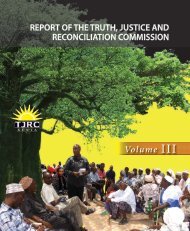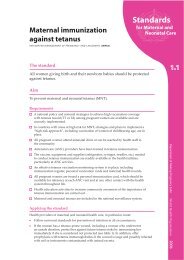SummaryWe are very good at saying we don’t leave a single stone unturned, but wedon’t turn a single stone. Maybe we turn pebbles.… Small stones are turned.The big ones, no one dares.—Kalenjin elder, on the lack of justice following post-election violence,Eldoret, May 27, 2011Four years after the onset of Kenya’s 2007-2008 post-election violence—and with a newelection campaign underway—Kenya’s government has done little to provide justice tovictims. The government has failed to ensure the prosecution of perpetrators in all but ahandful of the 1,133 or more killings committed during the violence, which pitted rulingparty supporters and the police against opposition-linked armed groups and civilians.Victims of rape, assault, arson, and other crimes similarly await justice.The Office of the Attorney General, through the Department of Public Prosecutions, hascompiled lists of thousands of cases allegedly linked to the election violence, ranging frompetty theft and rioting to rape and murder. But despite efforts to prioritize and act onserious cases in the immediate aftermath of the violence, there have been few prosecutionsand fewer convictions, as well as a near total lack of investigations of those who organizedand financed the violence. Hundreds of inquest files literally gather dust in police stations.The Commission to Investigate Post-Election Violence (CIPEV, also known as the WakiCommission after its president, Justice Philip Waki), which was formed in the wake of theviolence, conducted preliminary investigations and recommended establishing a specialtribunal, with a mandate to try the persons alleged to be most responsible for the violence.In December 2008 President Mwai Kibaki and Prime Minister Raila Odinga signed anagreement to establish the tribunal and implement the Waki recommendations in full. Butthe Kenyan government and parliament have since largely disregarded this commitment.The parliament and the cabinet shot down several proposals in 2009 to establish a specialtribunal. Some parliamentarians said they rejected the bills because they preferred to seecrimes against humanity tried at the International Criminal Court (ICC) in The Hague. Someof those same parliamentarians later hypocritically called on Kenya to withdraw from theRome Statute establishing the ICC. Kibaki suggested that the Truth, Justice andReconciliation Commission (TJRC), formed after the violence, could provide accountability.But while the commission has held hearings to elicit information about the violence, it isnot a judicial mechanism and cannot prosecute suspects.3 HUMAN RIGHTS WATCH | DECEMBER 2011
The ICC opened investigations into the post-election violence in March 2010. Kenyarepeatedly promised to cooperate with the investigations. However, when the ICCprosecutor requested summons for six high-profile political and opinion leaders inDecember 2010 the government balked, opting for a series of political and legal acrobaticsto try to postpone or prevent prosecutions.Cases against the six high-profile suspects advanced at the ICC despite the attempts toblock them. As “the first institution [Kenyan politicians] have come across that they cannotbribe, kill, or intimidate,” in the words of one Kenyan activist, the ICC is the focus of manyvictims’ hope for justice.But hundreds of other perpetrators of serious crimes continue to evade accountability. Afew have been convicted for serious crimes. A report prepared by the Department of PublicProsecutions in March 2011 claimed that 94 post-election cases had resulted inconvictions. But Human Rights Watch found that only a small percentage of thoseconvictions were for serious crimes that were actually related to the election violence,including two for murder, three for “robbery with violence” (one of the most serious crimesunder Kenya’s penal code, which can encompass robberies resulting in the death of thevictim), one for assault, and one for grievous harm.The limited success of cases in the ordinary courts shows that Kenyan authorities havebeen unwilling or unable to effectively prosecute post-election violence. In Uasin Gishudistrict, for instance, an epicenter of turbulence, no one has been convicted for at least230 killings. The fact that not a single police officer has been convicted for shootings orrapes directly related to the post-election violence, despite an estimated 962 policeshootings, 405 of them fatal, and dozens of reported rapes by police, also demonstratesthe extent of impunity for certain groups that appear to be protected.Lack of political will to address post-election violence is further demonstrated bygovernment failure to adequately compensate victims—including at least 21 victims ofpolice gunshots who filed, and won, civil suits claiming damages. When courts awardedthem compensation, the government failed to pay up.The ICC is a court of last resort and is likely to prosecute only a handful of thoseresponsible for the crimes within its jurisdiction—which covers genocide, war crimes, andcrimes against humanity—in any given situation. Additional investigations andprosecutions are needed in Kenya to widen accountability for the post-election violence.“TURNING PEBBLES” 4
- Page 1 and 2: Kenya“Turning Pebbles”Evading A
- Page 3 and 4: Copyright © 2011 Human Rights Watc
- Page 5 and 6: 3. Republic v. Charles Kipkumi Chep
- Page 7: OCSODMOHCHRPEVPNUSBGVSLDFTJRCWKLSOf
- Page 12 and 13: On Further Steps to Address Impunit
- Page 14 and 15: MethodologyHuman Rights Watch condu
- Page 16: on their land. 5 In 1992 a parliame
- Page 19 and 20: violent episode is often considered
- Page 23: • The killing of District Officer
- Page 26 and 27: The task force also visited differe
- Page 28 and 29: objections, including the concern t
- Page 30 and 31: The Department of Public Prosecutio
- Page 32: • An assault case listed among th
- Page 37 and 38: ack to our land.” 107 One impact
- Page 40 and 41: Later the same day, according to po
- Page 42 and 43: trial, the prosecutor presented no
- Page 44 and 45: In Nakuru district, a murder case,
- Page 46 and 47: 2. Republic v. John Kimita Mwaniki
- Page 48 and 49: A murder case in Timbaroa, Republic
- Page 50 and 51: IV. Weaknesses in Investigations an
- Page 52 and 53: Where police arrested suspects, the
- Page 54 and 55: One police officer told Human Right
- Page 56 and 57: witnesses to the court, including t
- Page 58 and 59:
put it into effect, but the governm
- Page 60 and 61:
there were no investigations into h
- Page 62 and 63:
should not necessarily have resulte
- Page 64 and 65:
This would appear to clear the way
- Page 66 and 67:
Most shootings were unlawful under
- Page 68 and 69:
I live in Chebilat Manaret town. On
- Page 70 and 71:
Some semblance of an internal inves
- Page 72 and 73:
justice, they were told either that
- Page 74 and 75:
laborer who washed cars for a livin
- Page 76 and 77:
Police ReformsKey to improving tran
- Page 78 and 79:
Judicial ReformsKenya has made nota
- Page 80 and 81:
expertise the Kenyan judicial syste
- Page 82 and 83:
heard from the police again—check
- Page 84 and 85:
such reparations. Civil society org
- Page 86 and 87:
AcknowledgmentsThis report was rese
- Page 88 and 89:
Bungoma (One court case researched)
- Page 90 and 91:
537/08 Barnabas Tiony Arson Acquitt
- Page 92 and 93:
95/08 Wesley Kipsang Korir Robbery
- Page 94 and 95:
Naivasha (Four court files research
- Page 96 and 97:
182/08 Daniel Moyi Makhopoand Domin
- Page 98 and 99:
Appendix II: Letter to Commissioner
- Page 100 and 101:
95 HUMAN RIGHTS WATCH | DECEMBER 20






